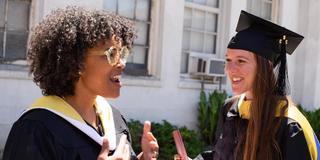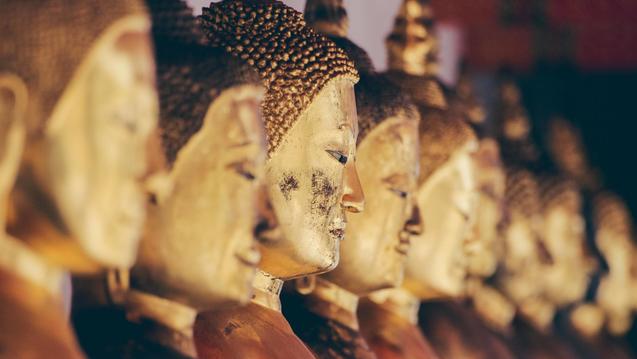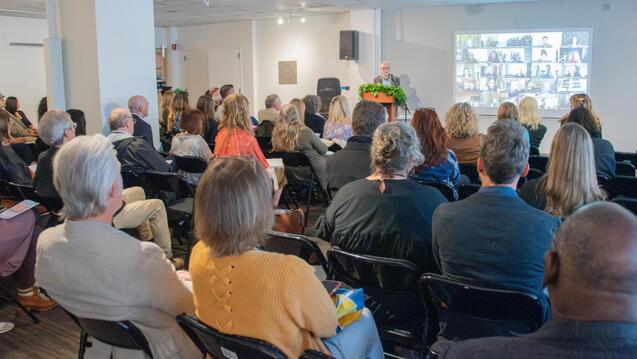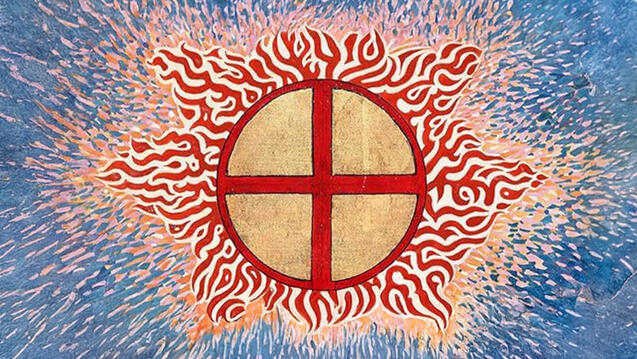A Conference Celebrating C.G. Jung’s 150th Birthday at CIIS

Department of East-West Psychology
Exploring the convergence of Eastern, Western, and Indigenous psychologies and spiritualities
Since 1975, CIIS’ East-West Psychology department has been exploring philosophies and psychologies that address issues of psychospiritual practice, embodied self-actualization, social justice, and ecological awareness. Drawing on the principles of CIIS’ founder Dr. Haridas Chaudhuri, we celebrate the connection between spiritual and psychological development; the department provides an experimental and creative space for bringing spirituality into academia with transformative modes of learning, practice, and writing.
All East-West Psychology coursework integrates multiple ways of knowing and invites students to examine and develop their unique rational, emotional, imaginal, and spiritual wisdom, as a foundation for the creation of holistic knowledge that meets the needs of their place and time. Our programs include Jungian and other alternative psychologies, contemplative methods, wisdom traditions, shamanic epistemologies, and forms of psychospiritual practice.
Community-building and collaborative learning are central to our pedagogical approach. The coursework includes dialogical inquiry, class presentations, small-group assignments and cooperative inquiry, as well as group work in daylong retreats. We encourage our students to share in the construction of knowledge, to create emotional and interpersonal competence, and to learn how to enter into fruitful exchange with people holding different views.
East-West Psychology faculty promote academic excellence and encourage students to present at professional conferences and to publish work in scholarly journals. Students leave our program with personal and professional connections that support their individual gifts and enhance their work in the world.
Our Programs
We offer an MFA as well as several joint MFA programs with the East-West Psychology department for those looking to enrich their experience with additional scholarship.
The program offers a field of study for scholar-practitioners interested in experiencing personal transformation and in becoming leaders who catalyze world transformation.
The master’s degree program prepares a new type of integral psychospiritual practitioner and scholar who is educated at the intersection of the world’s wisdom traditions and sacred practices of East, West, and Earth.
Become a catalyst for personal and societal change through our Ph.D. program.
Combine your academic and creative passions by getting an either an M.A. or Ph.D. and an MFA from our Interdisciplinary Arts program.
Earn a certificate in Yoga Studies, Eco-Resilience Leadership, or Spiritual Counseling in conjunction with our graduate programs.
Faculty Research and Scholarship
Our faculty have a wide range of research interests that include Asian wisdom traditions, Integral Yoga, Western religious and esoteric traditions, ecopsychology, and transpersonal and existential psychologies.

Philo-Sophia: Wisdom Goddess Traditions
This collection of essays by scholars and practitioners of world wisdom traditions reveal the Goddess of Wisdom in her myriad forms, offering access to existential truths via the paths of alternative knowledge models

A Jungian and Zen Approach to the Untamed Self in the Ten Oxherding Pictures
In this episode, CIIS professors Dr. Debashish Banerji and Dr. Sara Granovetter have a conversation about posthumanism, the Oxherding series, the Jungian individuation process, and the disowned wild self. Together, they explore how the ox may represent a part of the psyche that is habitually pushed to the margins of consciousness.

Magic, Mysticism, the Imagination, and the Emerging Global Paradigm with Stephen Julich
Drawing from his research in magic, mysticism, and Jungian studies, Stephen contemplates the religious imagination beyond its appropriation into systems of control to view it as the capacity to open us to a sense of wonder and awe.
FAQs
-
Students and graduates of our program have published articles in journals such as Asian Philosophy, Journal of Analytical Psychology, Journal of Humanistic Psychology, International Journal of Transpersonal Studies, Psychosis, ReVision, Archai: The Journal of Archetypal Cosmology, Journal of East-West Psychology, Journal of Child and Family Studies, and Somatics.
Graduates have also worked as associate managing editors and book review editors with the International Journal of Transpersonal Studies.
-
Students in our program have in recent years presented at professional conferences such as the American Academy of Religion Annual Meeting, the American Psychological Association (APA) Annual Convention, the Society of Theoretical and Philosophical Psychology Meeting (APA Division 24), ITP Conference on Spirituality and Psychology, International Conference on the Teaching of Psychology, the International Conference on Expressive Arts (Lima, Peru), The International Conference on the Teaching of Psychology, The International Conference on Learning, and the Daimonic Imagination Conference (University of Kent, UK).
-
We offer the option of an accelerated M.A./Ph.D. to students deemed capable of advanced and accelerated academic work.
To be eligible, students must:
- Complete all of their M.A. in EWP courses for letter grades instead of pass/no pass
- Have a GPA of at least 3.7
- Demonstrate Ph.D.-level writing and research skills
- Possess superior self-direction and psychological maturity for Ph.D. work
- Have a clear and workable dissertation topic, as determined by the admissions committee of the EWP Department
Additionally, students must submit:
- A goal statement
- A graduate transcript
Faculty will review all applicant materials.
The Ph.D. curriculum the student will be admitted under is determined as follows:
- Applicants are eligible to be considered for the 27-unit curriculum if they have a GPA of 3.7 or above in their M.A. in EWP.
- Applicants are eligible to be considered for the 18–24-unit curriculum if they have a GPA of 3.8 or above in the M.A. in EWP and have submitted a 1,000–5,000-word research proposal demonstrating the following:
- Clarity of research objectives
- Knowledge of foundational literature in the field of inquiry
- Appropriateness of the method of inquiry
- Originality of the proposal
- Clarity of articulation of the proposal
- Faculty assessment of readiness for the dissertation process based on superior academic research and writing skills demonstrated throughout the M.A.
-
In recent years, our students have won numerous scholarships in support of their research, including the Cultural Integration Fellowship's Integral scholarship, the Esalen scholarship, the Kranzke scholarship, the Student Alliance Scholarship for Social Justice Research, and the Baumann scholarship.
Graduates have also worked as associate managing editors and book review editors with the International Journal of Transpersonal Studies.
-
The roots of our program go back to 1968, when CIIS was founded. Originally, our school was called the California Institute of Asian Studies, and students there earned degrees in East-West comparative studies, focusing on philosophy, psychology, religion, and other fields.
Dr. Haridas Chaudhuri, founder of the Institute, emphasized the need for connecting psychology and spirituality, based on his own experiences and observations. He also derived inspiration from Sri Aurobindo, a modern Indian philosopher-mystic, who said that "yoga is nothing but practical psychology." Dr. Chaudhuri understood that spiritual and psychological development were inextricably connected, and that Western psychology could benefit from studying sacred psychologies embedded in Eastern spiritual traditions.
Dr. Chaudhuri intended East-West Psychology as an experiment. He was interested in what transformative alchemies of learning and practice might emerge in studies that bridged East and West. Dr. Chaudhuri taught that transformation is essentially experimental, an ongoing work of becoming. To remain viable, to grow to its full stature, every living being must adapt to the demands of its time while remaining true to its origins, values, and identity.
In 1975, East-West Psychology became a separate department, co-directed by Mary Oliver Tasch and Hilary Anderson. In the mid to late 1970s, various courses were taught in areas such as Asian psychology, yoga psychology, Buddhist psychology, integral psychology, archetypal psychology, parapsychology, humanistic and transpersonal psychologies. Meditation, tantra, mysticism, and altered states of consciousness were introduced by various faculty including Dr. Chaudhuri, Kimberly Mckell, Mary Tasch, Hilary Anderson, Rammurti Mishra, Ralph Metzner, and others.
-
Yes! Here are a few publications by our graduates:
The Helping Professional's Guide to End-of-Life Care: Practical Tools for Emotional, Social, & Spiritual Support for the Dying. (New Harbinger Publications, 2012) by Alessandra Strada Ph.D.
Emerging Earth: The Revealed Philosophy of the Evolution of Consciousness (SUNY Press, 2009) by Craig Bowman, Ph.D. '06
So What? Now What? The Anthropology of Consciousness Addresses a World in Crisis (Cambridge Scholars Press, 2009) co-edited by Tina Fields, Ph.D. '01
Relational Sandplay Therapy (Mustard Seed Press, 2005) by Linda Cunningham, Ph.D. '05
Our Upcoming Events
An online event with Admissions Counselors Skylar Hall and Ronda Sharp
Attend our in-person event on January 31 or online event on February 21.


Our Department in Action
Over 370 participants gathered at CIIS to honor Jung’s 150th birthday in a transformative exploration of psyche, purpose, and collective healing.
A graduate’s journey integrating Eastern contemplative wisdom with Western depth psychological frameworks.
Join CIIS to celebrate Jung’s legacy and explore his psychology’s impact on growth, healing, and cultural change in challenging times.



Take the Next Step
For over 50 years, CIIS has been at the forefront of education that integrates rigorous science, innovative scholarship, and social justice. You will learn from faculty at the forefront of their fields, local artists and activists, and a community of peers as passionate and dedicated as you. There’s never been a better time to be here – let’s build a healthier and more equitable world.











